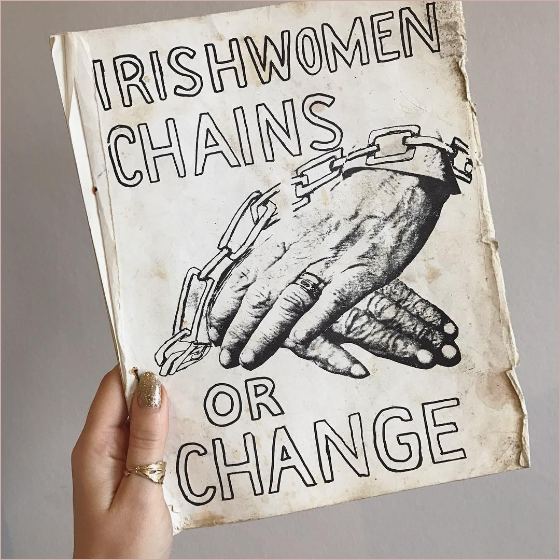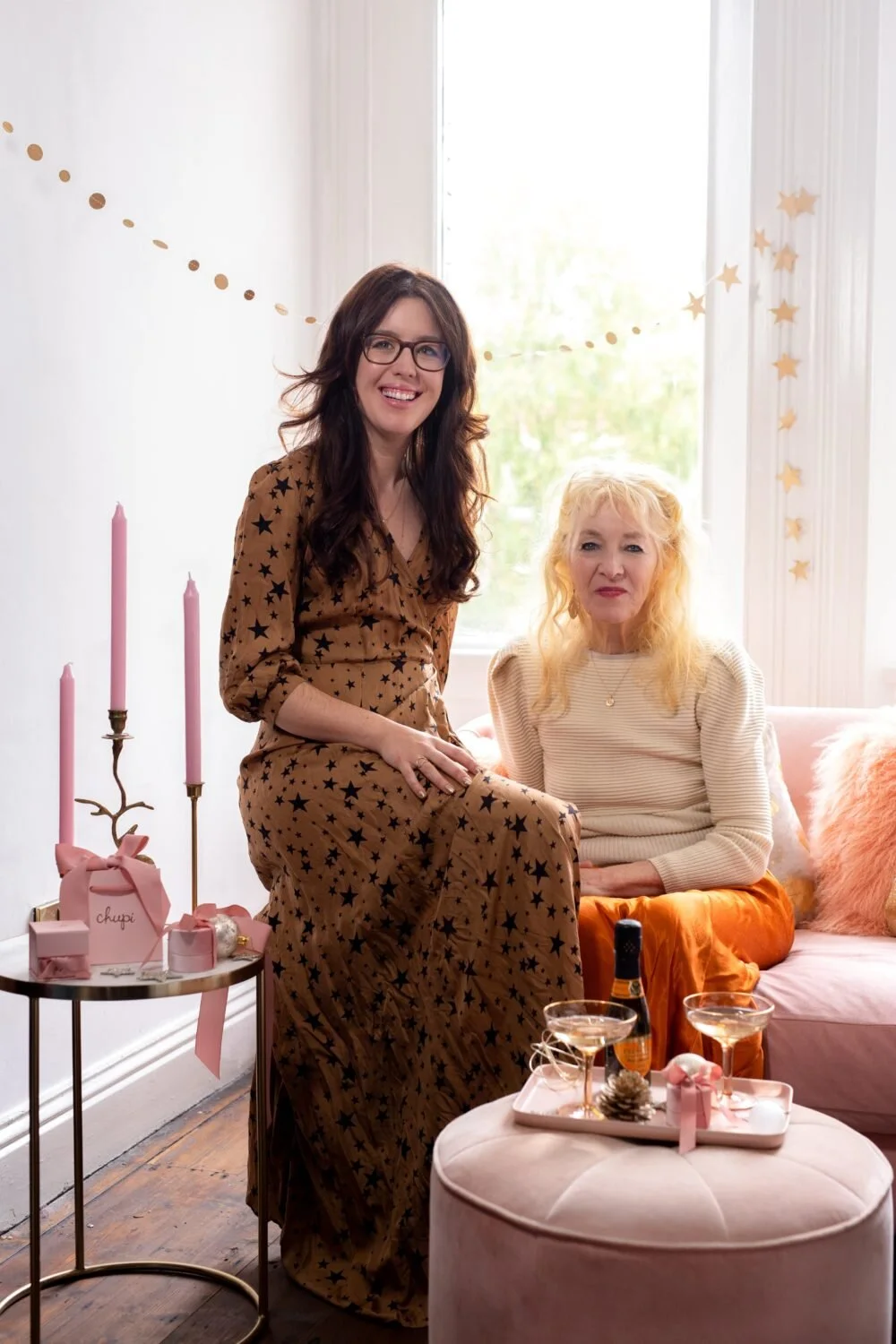A Feminist Fire
6 minute read
Did you know that 2021 marks the 50th anniversary of the foundation of the Irish Women’s Liberation Movement and the publication of its revolutionary manifesto Chains or Change? I didn’t until I spoke with Irish author, journalist and founding member of the movement Rosita Sweetman last week. After our wonderful conversation, I enthusiastically Googled “WLM Ireland 50 years” to find out how this seminal moment in modern Irish history will be marked in 2021. Despite the complications of Covid, there must be some kind of official celebration or state initiative planned to mark the moment when Irish women joined forces to ride the crest of second-wave feminism which was forcing a tsunami of change overseas?
Of course, I wasn’t expecting anything as grand as the parades and ceremonies that signified the 50th and 100th anniversaries of the Easter Rising, but surely there’d be at least one calendar date set aside for some form of remembrance, because in Ireland, we do commemorations as resolutely as we do weddings and wakes, don’t we? Well, not in this case. Apart from a two-hour Zoom talk hosted by Maynooth University Social Sciences Institute, my search came up as empty as Garret Fitzgerald’s promises to these women on an episode of The Late Late Show in March 1971, when he vowed before IWLM members Nell McCafferty and Máirín Johnson that politicians like him would happily grant change to the women of Ireland if they wanted it. It led to verbal fisticuffs between the audience, Fitzgerald and the IWLM representatives.
Rosita’s original copy of Chains or Change which you can download from Chupi’s site
Women wanted change alright. After that quintessentially controversial episode of The Late Late, Chains or Change sold out its first print run in a matter of days and the WLM held its first public meeting, which more than 1,000 women attended. Sweetman recalls these early years with real warmth. “The 1970s was an incredibly political time, but the women’s movement also had a social side to it. This was how we met up with our peers. It was so joyful and brilliant to be out together.” The 12 original members, which included broadcaster Mary Kenny and writer and activist Máirín de Burca, met regularly at Gaj’s restaurant on Baggot Street. Sweetman describes this venue as “the heart of politics in Dublin”.
Owned by Margaret Gaj, a characterful left-wing and women’s rights campaigner, Gaj’s was the favourite haunt of writers and revolutionaries, actors and activists, politicians and painters. Garret Fitzgerald once described it as “that place everyone is either going to or coming from” – a little like the Unicorn in the days of the Celtic Tiger but with less affectation and more authenticity. The romantic in me listens wistfully to Sweetman speak of the fun and excitement of meeting like-minded women in this city centre hotbed of activism. It reminds me a little of Mira from The Women’s Room, who escapes an oppressive marriage in a Desperate Housewives-type 1950s American suburbia for Harvard and a group of friends unwilling to settle for the social and political status quo.
Rosita and her daughter, Chupi
But there was very little that was romantic about women’s lives in the seventies and eighties in Ireland, as Sweetman explains. “Women had no equality in law,” she says. “Everything was stacked against you as a woman.” In 1989, Sweetman separated from her husband and the father of her two children, Chupi (the wildly successful jewellery designer), and Luke (now a film-maker). She describes feeling “marginalised” and being viewed as some kind of “weirdo” living in the countryside as a single mother of two children. “It was so difficult to get heard,” she laments. “Even the women in mediation were on his [her husband’s] side.”
On the subject of single and unmarried mothers and their treatment over the past 50 years, Sweetman is scathing and describes the mother and baby homes scandal as “the foremost feminist issue of today.” She believes the state remains afraid of the Catholic Church and so the institution still hasn’t been held to account. She is equally critical of the decision to hand the National Maternity Hospital over to the nuns. “In some ways, everything has changed for women. In other ways nothing has changed,” she says sagely. “There are still insane levels of stress for single parents today,” she adds. When I ask for her thoughts on the recent furore over women’s menopausal experiences, she replies flatly: “This is such familiar territory – if it’s a woman’s issue, who gives a shit?”
Last year, the 73-year-old’s latest book Feminism Backwards was published (it’s top of my reading list right now), a docu-memoir of how women have been treated through the ages and how misogyny got such a stranglehold on this country. Lest anyone think it’s some kind of man-hating, husband-berating bible, it very much positions feminism as a cause that will benefit both men and women. Indeed, she is full of praise for and goodwill towards the newspaper editors in the seventies – all men – who facilitated the IWLM’s cause by overseeing the transformation of the women’s pages from fluff about making jelly and knitting jumpers to fodder for a revolution. She namechecks Donal Foley and Tim Pat Coogan in particular. “Most of us in the IWLM were journalists, so we made the news then wrote it up and we were never censored.”
She is also quick to acknowledge how young men today have changed hugely just as young women have. “Neither feel they have to bow down to the Church or the government. They have none of the Catholic guilt of previous generations.” She adds, “Today, women’s legal status has been transformed. We have control over our own bodies. We can have our own careers. All of these changes mean power and freedom and allow women to have meaningful lives of their own.”
Sweetman’s own family trajectory provides an insightful snapshot of how a woman's lot has been transformed in the past 100 years and more. Her own mother, a bourgeois Catholic educated in England, desperately wanted to be a doctor but never fulfilled this dream because of the limitations imposed on women at the time, instead becoming a stay-at-home mother to nine children. She did, however, drive ambulances in Belfast during WWII, Sweetman informs me with admiration. “Had my mother been born at a different time, she would have had a very different life,” the author reflects. Today, Sweetman’s only daughter Chupi, meanwhile, is an entrepreneur, business owner, creative, mother, mentor and wife. She appears to have fulfilled every one of her dreams. What a difference a century makes.
Sweetman encourages the younger generation of women, and indeed women of all ages, to educate themselves by reading seminal feminist texts, just as she and her peers did 50 years ago, while listening to podcasts such as The Guilty Feminist – we’re both fans of Deborah Frances-White it turns out.
She also highlights a fabulous resource I didn’t know existed; The Feminist Library which has been archiving “herstories” since 1975 and from which you can order texts online. Besides her own books, Sweetman has also written two wonderful essays for The Irish Times on a couple of her own feminist icons, Kate Millett and Mary Wollstonecraft, which are well worth reading.
It saddens and frustrates me that so many of us probably didn't know about the 50th anniversary of Chains or Change. Wouldn’t it have been wonderful if, in March, The Late Late Show had invited Sweetman and other original members of IWLM back onto the show to reminisce about that original iconic episode, to reflect on the impact of their manifesto, and to discuss and debate women’s status and feminism in 21st-century Ireland? Because there’s still a lot to talk about. Reading other women’s stories is important, but sharing our own is vital. Ryan Tubridy if you’re reading this (you never know?), there’s still time. Better late than never.
Marie Kelly, June 2021
rosita speaks to project eve in 2017
What do you think?
Tell us in the comments below…
join the conversation
share and comment below, we’d love to hear your thoughts…












